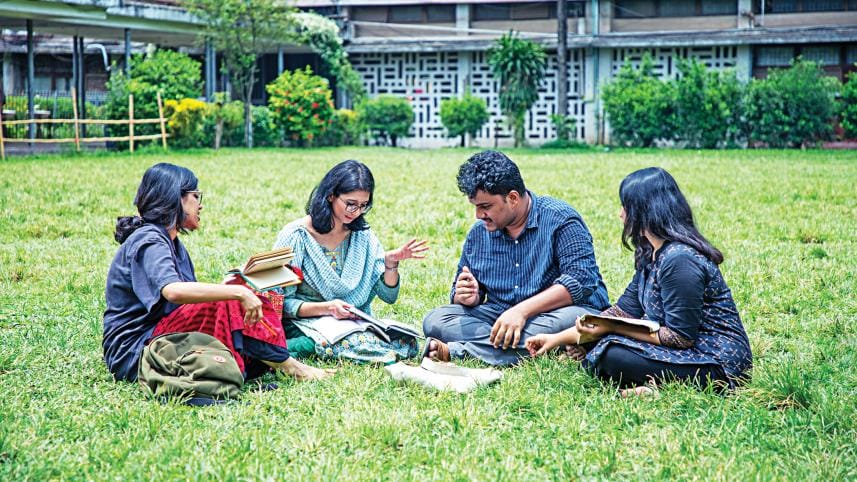Education reforms: Aligning curriculum with future job markets

It is often considered cliche to say "Education is the backbone of a nation", but it cannot be far from an important truth for Bangladesh. With a constant decrease of quality of education that is toppled with corrupted events such as questions leaks in national-scale exams, the education sector is in dire straits and needs priority reformation.
This reform cannot be accrue in a vacuum. Especially at a time when the country is aiming to prepare towards more developed prospects, the education needs to match with the job market of the future. That is to say, the education curriculum and its delivery both needs to align with the future demands, and needs to update from its old system.
What does the current curriculum prioritise?
Memorisation of a wide array of subjects is the modality of the current national curriculum education system at all levels – school, college, university, madrasa, and so on. It rarely, in reality, teaches important skills such as critical thinking, problem-solving, and creative skills that are increasingly essential in the 21st century. Although the "creative writing" modality was adopted in 2008, in reality, the system has been mostly rewarding memorisation as well. Most teachers are not trained enough to teach students on writing creatively, and most students also just write from memorisation because that is the default expectation. More often than not, teachers also skim while scoring or evaluating answer scripts, and in that effort prioritises lengthy answers or often presentable handwriting, which has no correlation with teaching standards.
It also prioritises creating polymaths, that is someone with knowledge about a range of issues. For example, a student of class eight in the national curriculum is expected to study Bangla (literature, grammar, additional reading), English, Mathematics (General and Higher), Arts and Crafts, Information and Career Technology, Career Education, Physics, Chemistry, Biology, Bangladesh and Global Studies, Physical Education, and so on. While at face it may seem to be making a student who is capable of many things with diverse skills, ultimately most students end up just memorising content for grade, as opposed to being able to study more on the subject they are passionate about.
The skills gap
According to the 'Future of Jobs Report 2025' by the World Economic Forum (WEF), the accelerated adoption of digital tools, remote work solutions, and advanced technologies such as machine learning and generative AI are going to change the skills outlook in the future job market globally. Currently, the education curriculum in Bangladesh is far from prioritising these skills. There is no chapter for example in the Information and Communication Technology textbook that covers updated usage of generative AI, for instance.
The WEF report also lists ten core skills that are the most important going forward towards employability, which are analytical thinking; resilience, flexibility and agility; leadership and social influence; creative thinking; motivation and self-awareness; technological literacy; empathy and active listening; curiosity and lifelong learning; service orientation and customer service; and talent management. As such, our education system needs to prioritise these skills for future job employability.

Current situation of the job market
As per the Bangladesh Bureau of Statistics (BBS), in 2023, the overall number of unemployed tertiary graduates, including university, college and madrasa graduates, stood at 9.06 lakh, up from 7.99 lakh a year ago. This is a staggering number of unemployment, and it is one that clearly has a trend of growing only.
A study by the Bangladesh Institute of Development Studies (BIDS) shows that 28.24% of graduates from National University-affiliated colleges are unemployed. The study also shows that rural students and women were disproportionately affected.
As per the World Bank, the percentage of unemployed tertiary-educated youth within the total unemployed population in Bangladesh increased to 27.8% in 2022 from 9.7% in 2013. This shows a mismatch of skills and qualification, that is leading to unemployment.
Moreover, as of April 2024, the ICT Division of the Bangladesh government estimates that there are 650,000 freelancers in Bangladesh. This shows there is a growing demand of the freelancer market as well, which would also require the curriculum to be in line with both global standards and global demands.
Reimagining the curriculum
To bridge these skill gaps listed above, we need a fundamental rethinking of our education curriculum. We must move beyond traditional subject boundaries and embrace interdisciplinary approaches that foster critical thinking, creativity, and problem-solving.
The first step would be integrating Science, Technology, Engineering, and Mathematics (STEM) fields as crucial drivers of innovation and economic growth. We need to strengthen STEM education at all levels, with a focus on hands-on learning, project-based activities, and real-world applications. This should include promoting coding and computational thinking from an early age. In specific, as the core skills indicate, there needs to be analytical ability incorporated here. This may look like, in the ICT textbook, to include exercises about generative AI prompts, to write codes that can create Large Language Models, and so on.
Currently there is a traditional boundary of perception that only studying STEM can lead to analytical skills or technical skills. This mindset also needs to be challenged in the reimagination of the curriculum. More often than not, students of arts or business studies can be just as well capable analytically. Business students need creative ability for entrepreneurial ideas, arts students explore new ways of expressing their art in modern alignment and so on, all of which requires strong analytical capacity.

There needs to be a distinct focus on developing 21st-century skills. Beyond technical skills, we must also cultivate essential soft skills such as communication, collaboration, adaptability, and leadership. These skills are crucial for success in the modern workplace, where teamwork, communication, and the ability to adapt to change are highly valued.
The second step would be promoting digital literacy. Currently, even in the school-level career guidance book, there is no proper financial teaching of the basic required knowledge. In an increasingly digital world, digital literacy is no longer optional but essential.
We need to equip students with the skills to navigate the digital landscape, use technology effectively, and critically evaluate online information. This includes teaching online safety, and responsible technology use.
Thirdly, there should be scope for practicing skills in educational institutions. For instance, there may be writing training centres in schools and universities, or public speaking platforms, that count towards final academic grading. Currently, grading is only contingent on academic performance and class performance, with minimal scope of encouragement for extracurricular activities that helps build skills for future job employability.
In this process, the system should aim to instill a love of learning in students and provide them with the tools and resources to continue learning beyond formal education. This includes promoting online learning platforms, vocational training programs, and continuing education opportunities.

Strengthening teacher training and development
Teachers are the backbone of any education system. To implement these curricular reforms effectively, we need to invest in high-quality teacher training and professional development. Teachers need to be equipped with the knowledge, skills, and pedagogical approaches to deliver a 21st-century education.
The first step needs to be providing training on new technologies. Teachers need to be proficient in using technology in the classroom and integrating it into their teaching practices. This includes training on digital tools, online learning platforms, and educational software.
The second step would be promoting innovative teaching methods, and we need to move away from traditional lecture-based teaching and embrace more interactive and engaging approaches. This includes training on project-based learning, collaborative learning, and inquiry-based learning.
The second step is that industry-academia partnership needs to increase as well. This would help make education more in line with what the industries are looking for, or needs, to be more accurate. Collaboration between educational institutions and the private sector can help ensure that curricula are relevant to the needs of industry and that students are equipped with the skills that employers are looking for. This includes internships, apprenticeships, and joint research projects.
The third step is that students' feedback needs to be incorporated in the performance review of teachers. Although some private universities have this system in name, and recently some public universities are following suit; this needs to be a standard default practice. This would help make teachers be more accountable to their duties, and they would strive for development as well so that they can get better student feedback.
Concluding thoughts
A reimagination of the Bangladeshi education system is a priority at this point. While many reforms are being debated and undertaken, there should be no doubt that education needs to be a priority sector. In that line, there should also be no doubt that these priority factors should be in sync with global demands and standards as well.
But for that to become a reality, concerted efforts are essential from policymakers, educators, and the private sector to implement these reforms effectively and ensure that everyone has access to quality education. Because only with a reformed education sector can we imagine a Bangladesh that will be reformed for all.
As the number of unemployed graduates keeps on increasing, the time for action is now. We cannot afford to delay these critical reforms any longer, as the more the number of unemployed grows, the harder these efforts become.
Ahmad Tousif Jami is an international debater instructor and a policy researcher. He is also an in-house contributor at the Tech & Startup department of The Daily Star.




 For all latest news, follow The Daily Star's Google News channel.
For all latest news, follow The Daily Star's Google News channel.
Comments